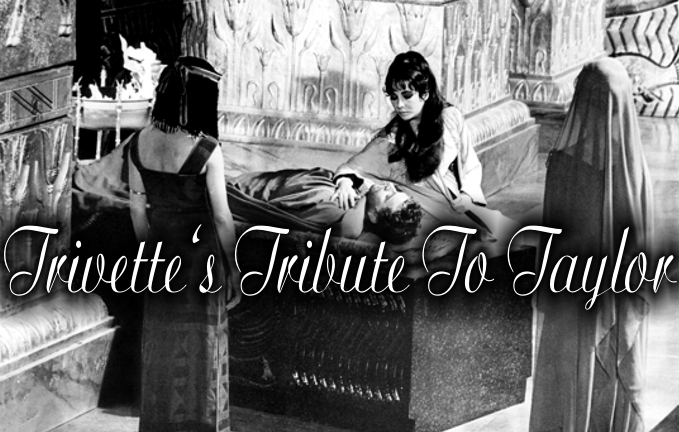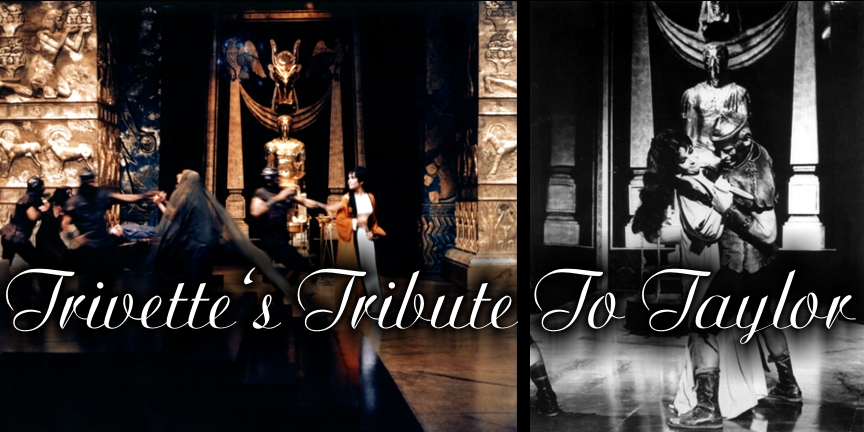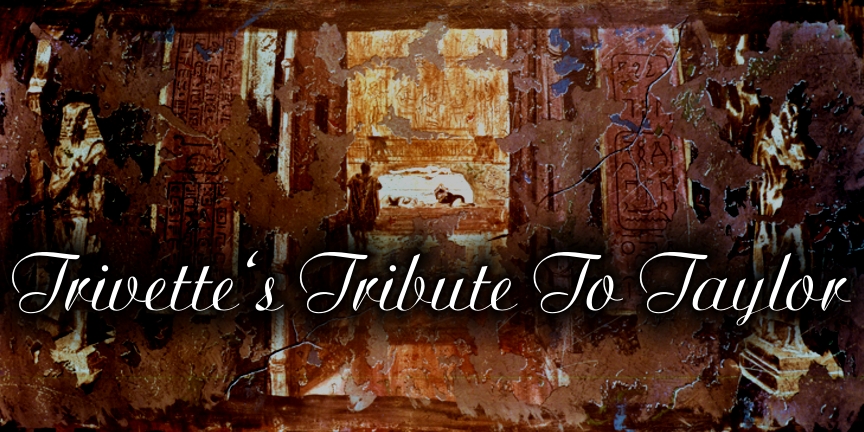

Continued from "The Restored Cleopatra", page 19 - Octavian has made the remark, "Queen Cleopatra's second procession into Rome will surpass her first." The scene dissolves to the exterior of the Palace in Alexandria. Near the Palace entrance is a small group, including Cleopatra and Caesarion. Cleopatra moves away from the group, with Caesarion...
CLEOPATRA
CAESARION
I'm afraid. I know I shouldn't be...
CLEOPATRA
Who told you that? All kings - and
especially queens - are afraid.
But they just manage not to show
it - something ordinary people
cannot do...
They embrace and he runs to mount his horse. His escort helps him up, then they ride off. Cleopatra waits until he is out of sight, then heads toward her mausoleum with Charmian and Eiras. The scene dissolves to a desert road. Antony, Rufio, Vallus, a Roman officer and three Egyptian officers ride quickly. Antony and the Romans are in front, followed by the Egyptians. Antony sees something and holds up his hand as a signal to stop. They come to a halt and see a large, disorganized army of mercenaries and Egyptians riding as fast as they can in the opposite direction. There is no shape or formation to the troops - they are obviously retreating in confusion as quickly as possible. As they watch, Rufio moves alongside of Antony. Vallus and the other Roman officer are just behind. The three Egyptian officers are together, and apart from the rest.
Suddenly - without warning - the Egyptian officers bolt at full gallop. They ride off to join the retreating army. Vallus draws his sword and whirls his horse to follow...
He starts off at a gallop. The other three ride after him. The scene dissolves to somewhere in the desert. From over the crest of a hill, in the distance, Caesarion and his guard are riding hard. In the foreground, unseen by Caesarion and his escort, is a patrol of mounted Roman archers. They take careful aim at the horses galloping below them. Caesarion is hit, and is thrown wildly from his horse. The rider of the pack horse is hit. Both he and his horse go down. The rest of the escort rides on. The pack horse scrambles to its feet - without its packs. Lying on the ground, split open by the impact, are the packs. Caesarion's golden armor is revealed - it glints in the sunlight. Octavian's patrol close in on the still figure of the little boy. The scene dissolves to Antony, Rufio, Vallus and the other officers riding into Antony's encampment. [At this point, the script and film do not match. It is obvious this scene was completely rewritten. What follows is how this scene was written according to the original script.] The camp is deserted. There is not a soldier to be seen. But, countless evidences that an army had been there and left hurriedly! Through the deserted expanse - one lonely little dog walks forlornly. Antony and his men stare unbelievingly at the sight. Rufio slips wordlessly from his horse. He starts to roam the scene of the massive desertion. The dog approaches the group and stares up curiously at the men.
Rufio continues to move through the debris and remains of the deserted camp. He is, to begin with, almost numbed by shock. For Rufio - whose existence has symbolized loyalty at its highest and most faithful level, whose life has been spent in serving two men with unquestioning faithfulness - the effect of the desertion is almost that of a sudden and gigantic amputation. The pain and horror of the loss arrive slowly. As it does now, with him. Antony, and the others watch Rufio curiously. Suddenly, from the direction of a high dune beyond the encampment, comes the sound of the beating of thousands of swords against thousands of shields! It is a frightening and blood-curdling noise - and grows constantly louder and nearer. Antony looks toward it alertly and draws his sword. Vallus and the other officer draw theirs. Rufio does not react at all to the noise - he continues his walk as if not hearing. Suddenly he stops. He stares down. Half buried in the sand is an abandoned standard with the "X" of the Tenth Legion. He bends slowly to raise it. Tears in hs eyes, he stares up at it. Slowly, he draws his sword. With their swords in hand, Antony, Vallus and the other officer face the approaching and increasing noise. The Roman Officer cannot stand it. Desperately, he gallops toward the high dune. As he rides, he throws away his sword. Antony turns to face Vallus. Vallus, rigid with fear, has made no effort to chase the Roman officer. Antony stares at him curiously. Vallus turns away - then reacts in sudden horror to what he sees. Antony follows his look.
Rufio kills himself in the traditional Roman manner, he "falls upon his sword". As he falls, he hits the standard of the Tenth Legion. It falls with him. The sand turns red with his blood. [There is a revision added to the script, which handles this scene a bit differently, but it still is completely unlike what we see in the completed film. In the film, we see Antony awaken, instantly knowing something is wrong because none of his guards came to wake him. Nor did Rufio, who was to wake him if any of the guards "forgot", or, "misjudged the time". He leaves his tent to find Rufio dead. Using the two versions of this scene, and what remains of the scene from the film, we most likey would have seen Rufio rise to make sure Antony was awakened. He then would find the camp deserted; this time, Antony's men have deserted HIM. (A payback for Actium?) Unable to bear the disloyalty shown to Antony, and, perhaps, preferring to die rather than see the look on Antony's face when he tells him he has been abandoned, Rufio falls on his sword.] Antony whirls his horse as if to ride to Rufio - then stops as he sees Octavian's troops cresting the dune, the sound of the beating now at its peak. Behind the wedge of officers, visible just over the dune, gleam row upon row of thousands of shining spears, javelins, standards, pennants, etc. The sound of the beating comes to an abrupt stop. There is a sudden great quiet. Antony and Vallus face Octavian and his forces. Antony stares rigidly ahead at Octavian. Behind him, Vallus is crying with fear. Antony does not turn to him:
Vallus tries to refuse, but cannot bring himself to speak. He merely shakes his head - tears running down his face...
He starts toward Octavian's army. As Vallus rides across to the dune, Antony is now alone - except for the little dog. It sits near the feet of his horse. There is a stillness. It is suddenly broken by Octavian:
Antony rides closer. He comes to a halt, confronting Octavian who remains behind the wedge of officers...
Agrippa tenses, then controls himself. He is obviously under orders to do just that. As are they all. Antony whirls his horse angrily and rides along the wedge of officers...
There is no reaction. In utter desperation, Antony draws his sword. He rides madly at the apex of he wedge, in an effort to break through and reach Octavian. The officers close ranks swiftly. They ward off Antony's blows with their shields - but do not strike back. Panting and dripping with sweat, Antony draws back with his horse. He stares at them in frustration - and then becomes suddenly quiet. He is now cut off completely from Rome - and the awareness of it has reached him. He slaps his sword back into its scabbard. From his saddle blanket he picks up he gold baton signifying the Roman Imperator. He looks at it:
He tosses the baton into the sand at the feet of Octavian's horse. Then he turns and rides off - toward Alexandria. Octavian and his officers watch Antony go. Then, upon a signal from Octavian, they turn their horses and ride back over the top of the dune. The scene is now completely deserted - except for the little dog. Curiously, he trots over to where Antony has thrown the baton. He sniffs at it. It is not a bone. The little dog sits and scratches himself. The scene dissolves to the open doors of Cleopatra's mausoleum. Through the doors is seen a stream of Alexandrians, their possessions and animals with them, push their way past the palace. Charmian and Eiras close the mausoleum doors and lower the bolt into place. The scene switches to Octavian heading his army toward Alexandria. He has Pompey's ring, still on its chain. He removes the chain and puts the ring on his hand. Following him is a wagon carrying the body of Caesarion and his golden armor. [In the script, this scene is actually placed a bit later in the film. Apparently, some need in the severe editing process resulted in this shift of order. The actual placement will be noted when it comes.] The scene dissolves to Antony, riding into the Palace enclosure in Alexandria. He enters the Palace and we see him come through the secret passage into Cleopatra's bedroom. It is deserted, except for Apollodorus, who sits at Cleopatra's dressing table. Before him are several small flasks, which he opens and sniffs...
Apollodorus makes no reply...
His meaning is unmistakable. Antony stares at him...
Apollodorus rises, but makes no move...
Antony nods slowly, as if in understanding.
[This is a reference to Rufio's death by the same manner.] He places his sword against his body and thrusts it into himself, throwing himself down the steps in an effort to drive the sword deeper. Apollodorus, overcome by guilt and self-reproach, hurries to his side. He turns Antony over, badly wounded - but still alive. He manages a bitter smile...
[At long last, finally, Cleopatra is waiting for Antony!]
Apollodorus helps Antony to his feet and they start off. The scene dissolves to Octavian, heading his army toward Alexandria. He has Pompey's ring, still on its chain. He removes the chain and puts the ring on his hand. Following him is a wagon carrying the body of Caesarion and his golden armor. [This is the correct placement for the scene.] The scene dissolves to the exterior of Cleopatra's mausoleum. Antony, lying on a construction sling, is being hoisted up by Apollodorus. The scene continues as we see it. Antony is hoisted to a window at the top of the mausoleum, where he is pulled inside by Cleopatra, Charmian and Eiras. There, Antony and Cleopatra share their last moments together...
Antony smiles. He seems to grow weaker - he struggles to speak...
Cleopatra holds her arms closer about him. She closes her eyes, as if actually sensing what she relates to him:
The scene continues uncut with Antony requesting one last kiss, "...to take my breath away." She kisses him as he dies. She stares down at him, knowing - and yet not wanting to know...and says, "There has never been such a silence." She hears the sound of the Romans approaching and holds Antony even closer, as if trying to protect him from them. The scene dissolves to the exterior of the Palace, and Octavian's army marching past the avenue of rams into the Royal Enclosure. The scene switches to Cleopatra's bedroom being invaded by Octavian and his men. There, they find Apollodorus, dead from a "...poison that smells like perfume." As Octavian moves to explore other areas of the bedroom, an officer, quite casually, informs him that Cleopatra has been found in her mausoleum, and that Mark Antony is dead. Octavian is outraged that the passing of such a man as Mark Antony should be so casually stated.
He stands before the library - roughly where Cleopatra stood to call Antony's name the night of her rejection by him. Octavian's officers stare silently at him. Lost in his own thoughts, he moves into the library, sits moodily in Cleopatra's chair.
With a swift movement, he buries his face in his hands. The scene dissolves to the exterior of Cleopatra's mausoleum. Agrippa pounds on the doors with the hilt of his sword. As he shouts, a squad of legionnaires carrying grappling hooks approaches quickly...
The squad with the grappling hooks arrives and starts throwing the hooks up at the window above. Inside the mausoleum, Cleopatra, Charmian and Eiras stand near Caesar's statue, facing the door and listening. Antony's body, covered by one of Cleopatra's robes, lies below the statue, on the block of stone where he had lain earlier.

The pounding of Agrippa's sword-hilt, and his muffled shouts drown out the noise of the grappling hooks being thrown against the other wall...
The three women remain motionless. Cleopatra smiles grimly at the thought of Octavian's generosity and good will. The grapplers have their hooks fast. Silently, they start to climb up the wall, and into the window. Agrippa presses against the doors, shouts even more urgently:
The mention of Caesarion has stirred Cleopatra. As Agrippa continues to speak, she moves slowly toward the doors - Charmian and Eiras remain where they were.
Cleopatra listens attentively - less-than-believingly - but intrigued. Eiras, turning away casually, sees the grapplers almost on them. She screams. She and Charmian attempt to run to Cleopatra, but they are seized and held fast. Cleopatra whirls at the scream - whips out her dagger and attempts to stab herself - but one of the men grabs her wrist. She, too, is held.

Other grapplers hurry to the doors, unbolt and swing them open. Agrippa enters, followed by his officers. As he enters:
The officer hurries out. Agrippa studiously avoids looking at Cleopatra. He regards the tomb curiously. Outside the mausoleum, Octavian hurries toward the open doors of it and enters alone. Inside, Charmian and Eiras stand together, not far from Cleopatra who is seated dejectedly. She does not look up as Octavian enters. Octavian ignores Cleopatra as he comes in. He crosses immediately to Antony's corpse. Agrippa uncovers his face. Octavian stares down impassively...
Octavian looks over at Cleopatra. She doesn't stir...
Agrippa gestures to the legionnaires who carry Antony's body out of the mausoleum. Antony's body passes Cleopatra; she raises her eyes briefly for one last look - then drops them again. Octavian, his hands folded absently behind his back, crosses to stand before her. She does no look up...
The scene continues with only one minor cut...
The scene continues uncut. Octavian, absently bringing his hands from behind his back, gives Cleopatra the sight of Pompey's ring on his hand. As she sees it, she realizes Caesarion is dead and closes her eyes in a spasm of private grief. She remarks that Octavian has not mentioned her son. He claims to have forgotten about him and asks his whereabouts. She replies only, "Safe." Then, she asks, "If I go with you to Rome, will you permit my son to rule Egypt - and his sons - and theirs?" "I will do everything I can," he replies. She then asks for some private rest. Octavian seems agreeable if she promises not to harm herself in any way. She answers, "I swear it - on the life of my son." He turns to go. Cleopatra adds, "Must the guards remain inside? I have, after all, sworn on the life of my son." Octavian gestures for the guards to leave. Now alone...
The rest of the film continues uncut. Eiras brings in the basket of figs as Cleopatra is finishing a written message. She tell Eiras that it is to be dropped to the guards as, "...the last thing you do." Cleopatra takes the basket of figs, and as she puts her hand deep into it, says, "The taste of these, they say, is sharp, and swiftly over."
Her eyes gently close and the scene dissolves to Cleopatra's apartment. Piles and baskets of gold treasure are strewn about. Octavian, on Cleopatra's throne, receives a message from "the Egyptian Queen". It is read to him...
Octavian has not waited beyond the word "buried". He hurries out of the apartment, Agrippa following. They stride into the mausoleum to find Cleopatra, in all her golden glory, lying in state upon the stone slab in the center of the room. Eiras lies where she was - but now sprawled in death. Charmian, dying, struggles to remain erect as she arranges her mistress' costume for the last time. Tight-lipped with fury, Octavian turns and leaves quickly.
She dies. As the Narrator speaks, the camera pulls back, in a continual retreat, through the open doors of the tomb. The action presses to a stop. The colors begin to fade - the effect of eons of aging transforms the scene to that of an ancient freize.
